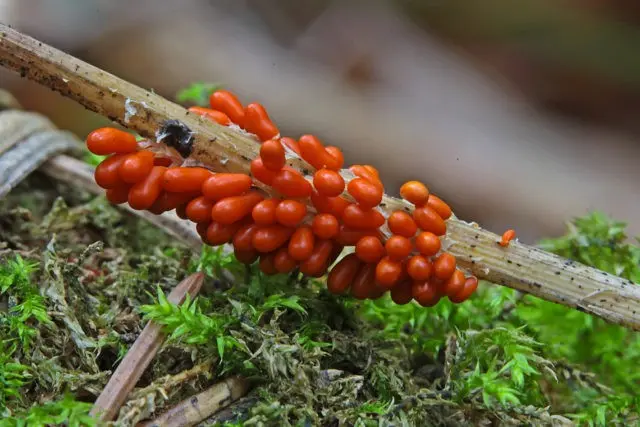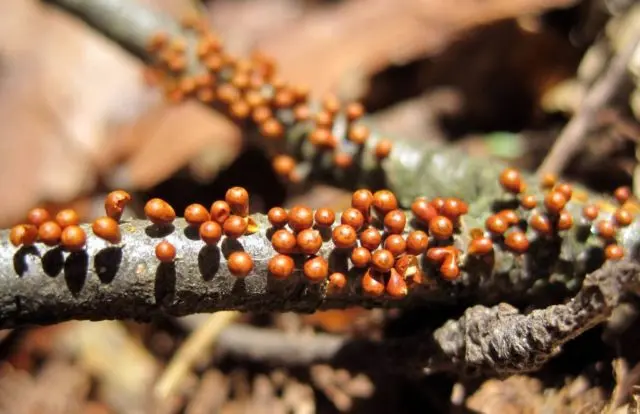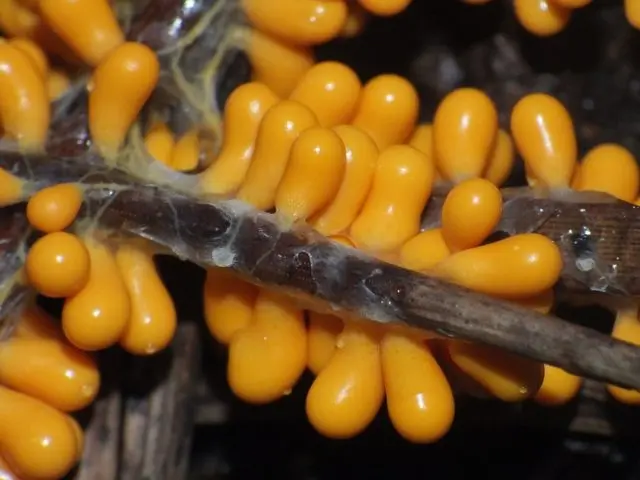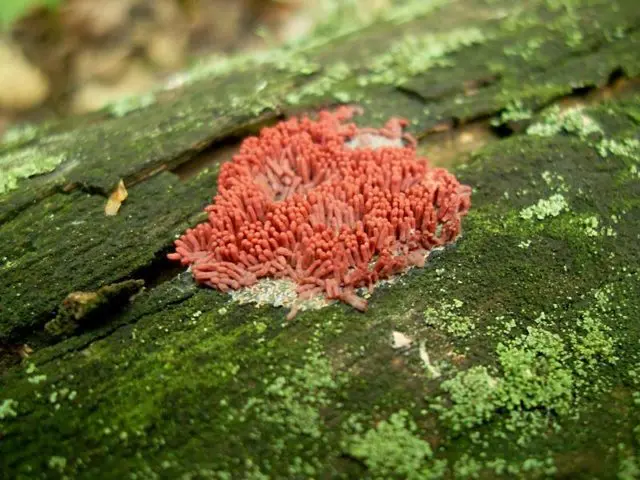Contents
Leocarpus brittle or fragile (Leocarpus fragilis) is an unusual fruiting body belonging to myxomycetes. Belongs to the Physarales family and the Physaraceae genus. At a young age, it resembles lower animals, and in adulthood it becomes like familiar mushrooms. Its other names:
- Lycoperdon fragile;
- Leocarpus vernicosus;
- Leangium or Physarum vernicosum;
- Diderma vernicosum.

The colony of this fungus looks like strange small berries or insect eggs.
Where does the brittle leocarpus grow
Leocarpus brittle – cosmopolitan, distributed throughout the globe in temperate, subarctic and subtropical climatic zones, in areas with a boreal climate. It has never been found in deserts, steppes and humid tropics. In Our Country, it is found everywhere, especially abundant in the taiga zones. He likes small-leaved and mixed forests, pine forests and spruce forests, often settles in blueberries.
Leocarpus brittle is not picky about the composition of the substrate and the nutritional value of the soil. Grows on dead parts of trees and shrubs: branches, bark, deadwood, in rotting stumps and fallen trunks, on deciduous waste. It can also develop on living plants: trunks, branches and leaves of trees, on grass, stems and shrubs. You can sometimes see ruminants and birds on the droppings.
In the Plasmodium state, these organisms are active enough to migrate over long distances and climb to the chosen places on the tops of the trees. Attaching with a thin flagellum-leg to the nutrient substrate, the brittle leocarpus turns into sporangia, located in close dense groups. It is very rare to see him alone.

The brittle leocarpus grows in close-knit teams, forming bright shiny garlands
What does brittle leocarpus look like
In the form of motile plasmodium, these organisms are amber-yellow or reddish in color. Sporangia are rounded, teardrop-shaped or spherical in shape. Very rarely they are elongated-cylindrical. Clings tightly to the host plant. The leg is short, filiform, white or light sand in color.
The diameter varies from 0,3 to 1,7 mm, the height is 0,5-5 mm during the period of spore maturation. The shell is three-layered: a fragile outer layer, a thick, dehydrated middle layer, and a membranous thin inner layer.
Fruiting bodies that have just appeared are a sunny yellow color, which darkens as it develops, first to honey-red, and then to brick brown and purple-black. The surface is smooth, varnish-shiny, dry, very brittle. Ripe spores break through the skin that has thinned to a parchment state and scatter. Spore powder is black.

Leocarpus brittle is very similar to other types of yellow-colored slime molds.
Is it possible to eat fragile leocarpus
There is no exact information about the edibility of this organism. The issue has been little studied, therefore the brittle leocarpus is classified as an inedible species.

Leocarpus brittle coral color on a fallen tree trunk
Conclusion
Leocarpus brittle belongs to the unique creatures of nature, animal mushrooms. At a young age, they demonstrate the behavior of the simplest organisms and are able to move, adult specimens have all the signs of ordinary fungi. classified as inedible species. They are widely distributed throughout the globe, with the exception of hot tropics and eternal ice. They are similar to other types of myxomycetes of red and yellow shades.









